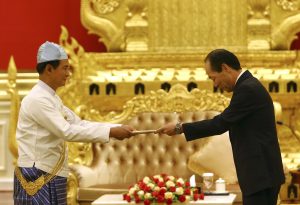Ichiro Maruyama, Japan’s ambassador to Myanmar, started a firestorm in December when he said he was “praying” for the International Court of Justice (ICJ) to side with Myanmar and rule that genocide had not occurred against the country’s long persecuted ethnic Rohingya Muslims. He looked foolish after the ICJ ruled against Myanmar and ordered the country to take steps to ensure that further acts of genocide would not occur.
Maruyama also sided with the Myanmar military against Rohingya victims when he claimed at a January event in Tokyo that the International Criminal Court, which is in the preliminary stages of an investigation into the crime against humanity of deportation and other related violations, shouldn’t be allowed to effectively “obstruct” the Japanese government’s diplomatic relationship with the Myanmar military.
While Maruyama’s comments last year were widely criticized in Japan and abroad, they were hardly out of step with the Japanese government’s longstanding approach in Myanmar, which is to curry favor with the government as part of its regional competition with China. It has been shocking to watch Japan try to placate a government and army that carried out a well-documented campaign of murder, rape, and torture against the Rohingya Muslims in Myanmar’s Rakhine state beginning in August 2017, burning villages and forcing more than 730,000 people to flee to Bangladesh.
In December, the Komeito leader Natsuo Yamaguchi, a junior partner in the ruling coalition in Tokyo, made the rounds in Myanmar. He praised Aung San Suu Kyi for attending the International Court of Justice hearing and even met with the military commander-in-chief, Sr. Gen. Min Aung Hlaing, whom the US has sanctioned and a UN-backed panel has recommended be investigated for genocide and other grave crimes. Worse, in October Prime Minister Shinzo Abe welcomed the general to Japan, just as he has repeatedly welcomed other beneficiaries of Japan’s “soft” policies in the region, such as the Cambodian dictator Hun Sen.
Tokyo has expressed pride for its support of a deeply flawed Myanmar government commission appointed to look into the problems in Rakhine State. The commission, which released its report in January, broke some important new ground, with the government admitting for the first time that the military was responsible for war crimes and killings there. Yet the report appears to be more of a public relations exercise than an attempt at justice and accountability. It found “no evidence of gang rape by Myanmar’s security forces,” despite extensive documentation by the United Nations and human rights groups, including Human Rights Watch. The report found no evidence of genocidal intent and did not address alleged crimes against humanity. It made the incredible claim that the abuses were not planned or carried out on the instructions of senior officers.
While other democracies have recoiled in horror, Japan has continued to pour in overseas aid, an example of what can be characterized as Japan’s “values-free” diplomacy. Japan has actively refused to join the growing chorus of countries condemning atrocities against the Rohingya, abstaining from nearly all Myanmar-related UN resolutions. In the name of “political neutrality” it has acquiesced to the bigotry of the Myanmar government, which takes the position that the Rohingya are not from Myanmar, even though the overwhelming majority have been there for generations. Japan has even joined the Myanmar government in refusing to use the term “Rohingya,” instead describing them as “Muslims in Rakhine State.”
Japan has also been aggressive in pursuing its economic interests in Myanmar, hosting investment forums both in Rakhine State and Tokyo that have aided in attempts to paper over the Rohingya crisis.
The Japanese government has offered a variety of flimsy excuses for its approach. The most common is that making friends with despots and killers in places like Myanmar and Cambodia is the best way to persuade them to carry out reforms. But this argument simply provides cover for trying to create business opportunities while competing with China for alliances with unsavory and authoritarian leaders.
Given its long history of impunity, there is little reason to expect the Myanmar military to hold senior officers accountable or to make any systemic changes. Indeed, the Japanese government would have us believe that the same people who presided over the attacks on the Rohingya are now going to lead the effort for justice and create safe conditions for the Rohingya to return home.
The Japanese government should realize that its approach is making Japan an embarrassing outlier, closer to China’s approach toward countries that consistently violate human rights than to the reactions of other democratic countries. International condemnation of the brutal tactics of Myanmar’s military has been widespread, with Canada, Bangladesh, Nigeria, Turkey, and France accusing Myanmar of committing genocide against the Rohingya. The 57-member Organisation of Islamic Cooperation supported the case at the ICJ.
It is not too late for Japan to change course and restore its credibility as a rights-respecting nation on the global stage. Japan should remember that defending the likes of Min Aung Hlaing puts it on the wrong side of history. Above all, Japan should be showing its human rights leadership by standing with Myanmar’s countless victims, including the Rohingya. It should be voting in favor of human rights resolutions at the UN and supporting efforts at justice for victims, instead of providing cover for their oppressors.
Teppei Kasai is Program Officer for Human Rights Watch in Tokyo, Japan

































